יאָשקע ון אָדעס
Berta Flaksman / בערטאַ פֿלאַקסמאַן
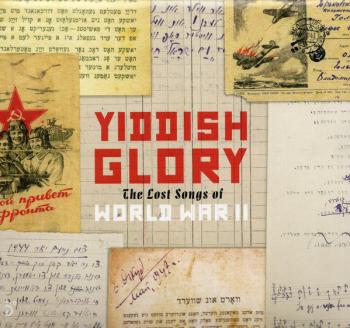
Yoshke fun Odes
[194?...]
Album / Albumi: Yiddish Glory – The Lost Songs Of World War II [2018]
YIDDISH GLORY – THE LOST SONGS OF WORLD WAR II [2018]
Babi Yar (Golda Rovinskaja)
Af hoykhn barg (Veli Šargorodskij)
Yoshke fun Odes (Berta Flaksman)
Mayn pulemyot (Anonimo / Anonymous)
Taybls briv (Taybl Birman)
Misha tserayst Hitlers Daytshland (Taybl Birman)
Another song in that vein features “Yoshke fun Odes” (Yoshke from Odessa), a raging Jewish butcher who is fully the match of the German butchers who “desolated and destroyed our beautiful city.” In Berta Flaksman’s lyric:
For three full days he hailed them down,
firing one after the other.
Yoshke didn’t stop firing bullets from his rifle,
He bashed those fascists without a care—not a bit of respect!
The mutilated bodies fell near the half-dead covering the earth.
Any question why Yoshke sought just and righteous retribution?... (Continues)
[194?...]
Album / Albumi: Yiddish Glory – The Lost Songs Of World War II [2018]
YIDDISH GLORY – THE LOST SONGS OF WORLD WAR II [2018]
Babi Yar (Golda Rovinskaja)
Af hoykhn barg (Veli Šargorodskij)
Yoshke fun Odes (Berta Flaksman)
Mayn pulemyot (Anonimo / Anonymous)
Taybls briv (Taybl Birman)
Misha tserayst Hitlers Daytshland (Taybl Birman)
Another song in that vein features “Yoshke fun Odes” (Yoshke from Odessa), a raging Jewish butcher who is fully the match of the German butchers who “desolated and destroyed our beautiful city.” In Berta Flaksman’s lyric:
For three full days he hailed them down,
firing one after the other.
Yoshke didn’t stop firing bullets from his rifle,
He bashed those fascists without a care—not a bit of respect!
The mutilated bodies fell near the half-dead covering the earth.
Any question why Yoshke sought just and righteous retribution?... (Continues)
פון דער היײַנטעקער מילכאָמע װעל איך לידער זינגען, [1]
(Continues)
(Continues)
Contributed by Dq82 2022/6/6 - 13:56
אפן הויכן באַרג

Afn hoykhn barg
[1944]
Album / Albumi: Yiddish Glory – The Lost Songs Of World War II [2018]
YIDDISH GLORY – THE LOST SONGS OF WORLD WAR II [2018]

Babi Yar (Golda Rovinskaja)
Af hoykhn barg (Veli Šargorodskij)
Yoshke fun Odes (Berta Flaksman)
Mayn pulemyot (Anonimo / Anonymous)
Taybls briv (Taybl Birman)
Misha tserayst Hitlers Daytshland (Taybl Birman)
Other songs openly wear their feelings of resentment and hatred for the Nazis, and the accursed name Hitler appears about as often as Stalin’s. “Afn hoykhn barg” (On the High Mountain), by Odessa-born Veli Shargorodskii, satirizes Hitler’s failed attempt to seize the natural resources he was after in Ukraine, Crimea and the Caucasus. It was recorded in Uzbekistan in the summer of 1944. The Germans had been turned back at Stalingrad the year before, and now “Germany is in trouble, Hitler is kaput!”
[1944]
Album / Albumi: Yiddish Glory – The Lost Songs Of World War II [2018]
YIDDISH GLORY – THE LOST SONGS OF WORLD WAR II [2018]

Babi Yar (Golda Rovinskaja)
Af hoykhn barg (Veli Šargorodskij)
Yoshke fun Odes (Berta Flaksman)
Mayn pulemyot (Anonimo / Anonymous)
Taybls briv (Taybl Birman)
Misha tserayst Hitlers Daytshland (Taybl Birman)
Other songs openly wear their feelings of resentment and hatred for the Nazis, and the accursed name Hitler appears about as often as Stalin’s. “Afn hoykhn barg” (On the High Mountain), by Odessa-born Veli Shargorodskii, satirizes Hitler’s failed attempt to seize the natural resources he was after in Ukraine, Crimea and the Caucasus. It was recorded in Uzbekistan in the summer of 1944. The Germans had been turned back at Stalingrad the year before, and now “Germany is in trouble, Hitler is kaput!”
אַפֿן הויכן באַרג און אַפֿן גרינעם גראָז [1]
(Continues)
(Continues)
Contributed by Dq82 2022/6/6 - 13:05
שפּאַציר אין וואַלד

Shpatsir In Vald
194?
2018
Yiddish Glory – The Lost Songs Of World War II
“Shpatsir in vald” (A Walk in the Forest), by tailor Klara Sheynis, 25, from Cheboksary in the Chuvashia Region, recounts in waltz time an affecting farewell exchange between two lovers before he goes off to the front. They have obviously spent the night together in the forest. One can only be reminded of Romeo and Juliet awakening together:
See, the sun is already rising,
The world will soon be full of light.
Go, take revenge on the fascists,
My hero will come back with a badge of honor.
But maybe not alive. So many young people’s lives were upended by war and destruction. People hung their futures on slender hopes. So much had to be rebuilt, physically and emotionally, after the war ended.
194?
2018
Yiddish Glory – The Lost Songs Of World War II
“Shpatsir in vald” (A Walk in the Forest), by tailor Klara Sheynis, 25, from Cheboksary in the Chuvashia Region, recounts in waltz time an affecting farewell exchange between two lovers before he goes off to the front. They have obviously spent the night together in the forest. One can only be reminded of Romeo and Juliet awakening together:
See, the sun is already rising,
The world will soon be full of light.
Go, take revenge on the fascists,
My hero will come back with a badge of honor.
But maybe not alive. So many young people’s lives were upended by war and destruction. People hung their futures on slender hopes. So much had to be rebuilt, physically and emotionally, after the war ended.
מיר זיינען ערשט נעכטן געגאנגען
(Continues)
(Continues)
Contributed by Dq82 2022/6/2 - 19:31
Song Itineraries:
Anti War Love Songs
באַבי־יאַר

Babi-Yar
[1947]
Musica / Music / Musique / Sävel: In droysn geyt a regn
Album / Albumi: Yiddish Glory – The Lost Songs Of World War II [2018]
YIDDISH GLORY – THE LOST SONGS OF WORLD WAR II [2018]
Babi Yar (Golda Rovinskaja)
Af hoykhn barg (Veli Šargorodskij)
Yoshke fun Odes (Berta Flaksman)
Mayn pulemyot (Anonimo / Anonymous)
Taybls briv (Taybl Birman)
Misha tserayst Hitlers Daytshland (Taybl Birman)
The song is likely based on eyewitness accounts of the massacre in Babi Yar, the ravine near Kiev, where 33,771 Jews were shot on September 29-30, 1941.
Witnesses reported blood pouring through the streets, gunshots throughout the day and night, and other atrocities, which are described in the song.
The song probably also tells us something about 1947, in addition to 1941. It hints at the immediate post-war ethnic tension between Jews, returning from the Soviet rear, and facing... (Continues)
[1947]
Musica / Music / Musique / Sävel: In droysn geyt a regn
Album / Albumi: Yiddish Glory – The Lost Songs Of World War II [2018]
YIDDISH GLORY – THE LOST SONGS OF WORLD WAR II [2018]
Babi Yar (Golda Rovinskaja)
Af hoykhn barg (Veli Šargorodskij)
Yoshke fun Odes (Berta Flaksman)
Mayn pulemyot (Anonimo / Anonymous)
Taybls briv (Taybl Birman)
Misha tserayst Hitlers Daytshland (Taybl Birman)
The song is likely based on eyewitness accounts of the massacre in Babi Yar, the ravine near Kiev, where 33,771 Jews were shot on September 29-30, 1941.
Witnesses reported blood pouring through the streets, gunshots throughout the day and night, and other atrocities, which are described in the song.
The song probably also tells us something about 1947, in addition to 1941. It hints at the immediate post-war ethnic tension between Jews, returning from the Soviet rear, and facing... (Continues)
גיי איך מיר פֿון פֿראָנט מיט אַ גרויסער פֿרייד, [1]
(Continues)
(Continues)
Contributed by Dq82 2022/6/2 - 19:07
Song Itineraries:
Extermination camps
אַרבעטער־פֿרױען
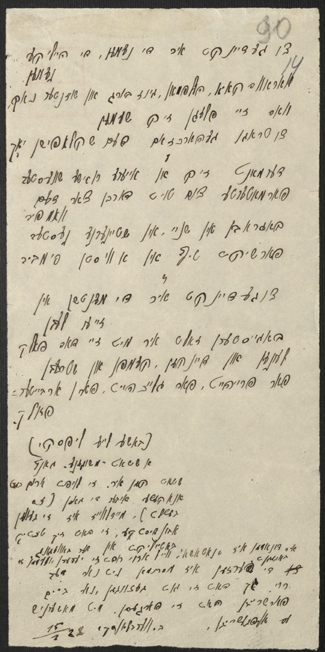
Arbeter-froyen
[1881]
Testo / Lyrics / Paroles / Sanat: David Edelstadt (Dovid Edelshtot)
Collected 1928 by Berl Verblunsky from Basha Leye Lipski
La genesi di questa canzone è abbastanza complessa. In origine era una delle molte poesie “bundiste” di Dovid Edelshtot (David Edelstadt in forma germanizzata); poesia che, assai probabilmente, era divenuta subito canzone. David Edelstadt, nato nel 1866 a Kaluga (circa 200 km a sud di Mosca), fu un precocissimo rivoluzionario e poeta in lingua yiddish; a soli 15 anni emigrò negli USA per sfuggire ai pogrom antisemiti susseguenti al riuscito attentato contro lo zar Alessandro II (13 marzo 1881). A New York, David Edelstadt divenne militante del movimento anarchico e responsabile della rivista in yiddish Fraye Arbeter Shtime (“Libera Voce dei Lavoratori”), sulla quale pubbicava anche le sue poesie; poiché David Edelstadt morì nel 1892 a soli... (Continues)
[1881]
Testo / Lyrics / Paroles / Sanat: David Edelstadt (Dovid Edelshtot)
Collected 1928 by Berl Verblunsky from Basha Leye Lipski
La genesi di questa canzone è abbastanza complessa. In origine era una delle molte poesie “bundiste” di Dovid Edelshtot (David Edelstadt in forma germanizzata); poesia che, assai probabilmente, era divenuta subito canzone. David Edelstadt, nato nel 1866 a Kaluga (circa 200 km a sud di Mosca), fu un precocissimo rivoluzionario e poeta in lingua yiddish; a soli 15 anni emigrò negli USA per sfuggire ai pogrom antisemiti susseguenti al riuscito attentato contro lo zar Alessandro II (13 marzo 1881). A New York, David Edelstadt divenne militante del movimento anarchico e responsabile della rivista in yiddish Fraye Arbeter Shtime (“Libera Voce dei Lavoratori”), sulla quale pubbicava anche le sue poesie; poiché David Edelstadt morì nel 1892 a soli... (Continues)
אַרבעטער־פֿרױען, לײַדנדע פֿרױען! [1]
(Continues)
(Continues)
Contributed by Riccardo Venturi 2022/3/25 - 10:53
Song Itineraries:
The War of Labour: Emigration, Immigration, Exploitation, Slavery
איך װיל ניט קײן אײַזערנע קײטן
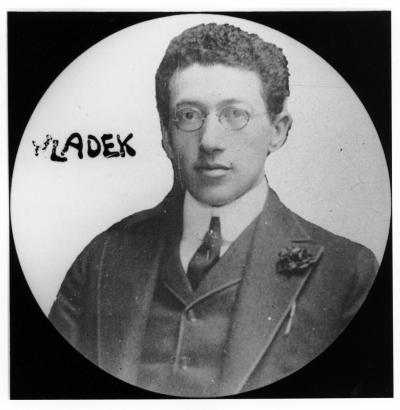
Ik vil nit keyn ayzerne keytn
[?]
Testo / Lyrics / Paroles / Sanat: Baruch "Vladeck" Charney
Musica / Music / Musique / Sävel: Mikhl Gelbart (1889-1962)
Ancora dal repertorio della band Koyt Far Dayn Fardrakht, una canzone musicata da Mikhl Gelbart e di cui non sono -almeno per ora- riuscito a determinare l'anno di composizione anche se, probabilmente, è successivo al 1908, l'anno in cui l'autore, Baruch “Vladeck” Charney, fuggì emigrando nei Faraynikte Shtatn.
Baruch Charney (Baruch = Benedetto, come Spinoza) era nato a Dukor, un villaggio non lontano da Minsk in Bielorussia, il 13 gennaio 1886; era figlio di un ebreo ultraortodosso chasīd Lubavitch, Zev Volf; poiché, come è noto, l'ebraismo si trasmette per via femminile, assunse il cognome della madre, Brokhe Tsharney. Tsharney, o Tsharny, è la resa del bielorusso Чарны, che significa “nero”; indi per cui un fratello di Baruch,... (Continues)
[?]
Testo / Lyrics / Paroles / Sanat: Baruch "Vladeck" Charney
Musica / Music / Musique / Sävel: Mikhl Gelbart (1889-1962)
Ancora dal repertorio della band Koyt Far Dayn Fardrakht, una canzone musicata da Mikhl Gelbart e di cui non sono -almeno per ora- riuscito a determinare l'anno di composizione anche se, probabilmente, è successivo al 1908, l'anno in cui l'autore, Baruch “Vladeck” Charney, fuggì emigrando nei Faraynikte Shtatn.
Baruch Charney (Baruch = Benedetto, come Spinoza) era nato a Dukor, un villaggio non lontano da Minsk in Bielorussia, il 13 gennaio 1886; era figlio di un ebreo ultraortodosso chasīd Lubavitch, Zev Volf; poiché, come è noto, l'ebraismo si trasmette per via femminile, assunse il cognome della madre, Brokhe Tsharney. Tsharney, o Tsharny, è la resa del bielorusso Чарны, che significa “nero”; indi per cui un fratello di Baruch,... (Continues)
איך װיל ניט קײן אײַזערנע קײטן, [1]
(Continues)
(Continues)
Contributed by Riccardo Venturi 2022/3/22 - 07:09
Song Itineraries:
The War of Labour: Emigration, Immigration, Exploitation, Slavery
דעם נײַנטן יאַנװאַר
Anonymous
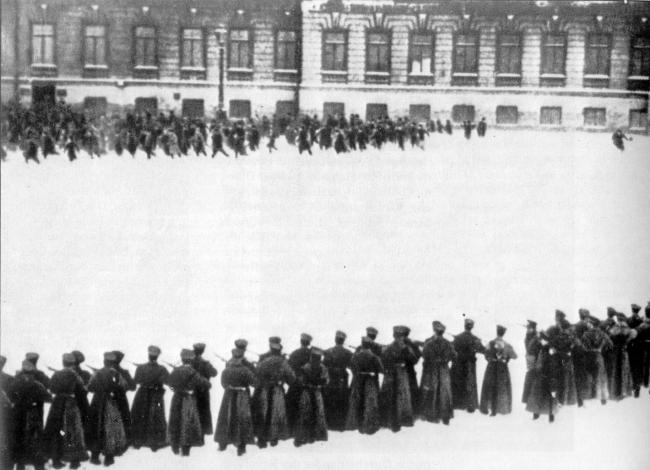
Dem nayntn yanvar
Yiddish Ukrainian folk tune / Canzone popolare yiddish ucraina
~ 1914 (?)
Il gruppo Koyt Far Dayn Fardakht (yiddish קױט פֿאר דײַן פֿאַרדאַכט , lett. “Vaffanculo al tuo sospetto”) è una band newyorkese queer/trans punk ebraica antisionista di lingua yiddish. Non starò a dire come ci sono arrivato, a loro e a quel che fanno; dirò solo come si presentano nel pdf da cui deriva questa pagina (mantenendo tutte le anarchiche minuscole):
we are a punk band that plays yiddish anarchist and bundist songs (and some other yiddish radical tunes)— the soundtrack to strikes, uprisings, assassinations, and revolutionary movements from odessa and vilna to new york and galveston to buenos aires and havana. we sing these songs because they’re bad-ass, because we believe in them and in the movements that made them possible, because we are part of those movements. we sing them in our... (Continues)
Yiddish Ukrainian folk tune / Canzone popolare yiddish ucraina
~ 1914 (?)
Il gruppo Koyt Far Dayn Fardakht (yiddish קױט פֿאר דײַן פֿאַרדאַכט , lett. “Vaffanculo al tuo sospetto”) è una band newyorkese queer/trans punk ebraica antisionista di lingua yiddish. Non starò a dire come ci sono arrivato, a loro e a quel che fanno; dirò solo come si presentano nel pdf da cui deriva questa pagina (mantenendo tutte le anarchiche minuscole):
we are a punk band that plays yiddish anarchist and bundist songs (and some other yiddish radical tunes)— the soundtrack to strikes, uprisings, assassinations, and revolutionary movements from odessa and vilna to new york and galveston to buenos aires and havana. we sing these songs because they’re bad-ass, because we believe in them and in the movements that made them possible, because we are part of those movements. we sing them in our... (Continues)
דעם נײַנטן יאַנװאַר [1]
(Continues)
(Continues)
Contributed by Riccardo Venturi 2022/3/19 - 11:55
Song Itineraries:
From World Jails
אדעסאַ מאַמע
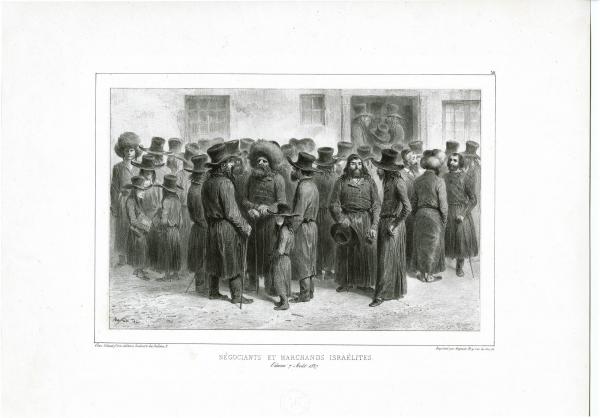
Adesa mame
[1933 circa]
ליריקס און מוזיק / Testo e musica / Lyrics and music / Paroles et musique / Sanat ja sävel :
Pesach Burstein
פּערפאָרמער / Interpreti / Performed by / Interprétée par / Laulavat:
1. The Klezmer Conservatory Band
Album: The Thirteenth Anniversary Album ,1993
2. Pesach Burstein
Album: The Mazeltones Odessa, Washington
*Black-and-white lithograph of Jewish traders and merchants in Odessa by Denis Auguste Marie Raffet,. From “Voyage dans la Russie Méridionale & la Crimée par la Hongrie, la Valachie et la Moldavie”
E’ una canzone yiddish di Pesach Burstein. Parole e musica sono diverse da quelli dell’ omonima אדעסאַ מאַמאַ di Lebedeff. Entrambe condividono la nostalgia di Odessa, città di singolare convivenza metatemporale. Le Storie, così come i crimini contro l’umanità, raramente si ripresentano nelle stesse forme mentre i paradigmi di morte si... (Continues)
[1933 circa]
ליריקס און מוזיק / Testo e musica / Lyrics and music / Paroles et musique / Sanat ja sävel :
Pesach Burstein
פּערפאָרמער / Interpreti / Performed by / Interprétée par / Laulavat:
1. The Klezmer Conservatory Band
Album: The Thirteenth Anniversary Album ,1993
2. Pesach Burstein
Album: The Mazeltones Odessa, Washington
*Black-and-white lithograph of Jewish traders and merchants in Odessa by Denis Auguste Marie Raffet,. From “Voyage dans la Russie Méridionale & la Crimée par la Hongrie, la Valachie et la Moldavie”
E’ una canzone yiddish di Pesach Burstein. Parole e musica sono diverse da quelli dell’ omonima אדעסאַ מאַמאַ di Lebedeff. Entrambe condividono la nostalgia di Odessa, città di singolare convivenza metatemporale. Le Storie, così come i crimini contro l’umanità, raramente si ripresentano nelle stesse forme mentre i paradigmi di morte si... (Continues)
[1] איך האָב געהערט פֿיל לידער זינגען גוטע,
(Continues)
(Continues)
Contributed by Riccardo Gullotta 2022/3/14 - 08:32
Song Itineraries:
Bridges, Exiles and exilees
דער זינגער פֿון נױט
Der zinger fun noyt
אױ, אָרעמער נאַרישער זינגער, [1]
(Continues)
(Continues)
Contributed by Bernart Bartleby + CCG/AWS Staff 2021/11/30 - 09:58
צװישן די בערג די גרינע
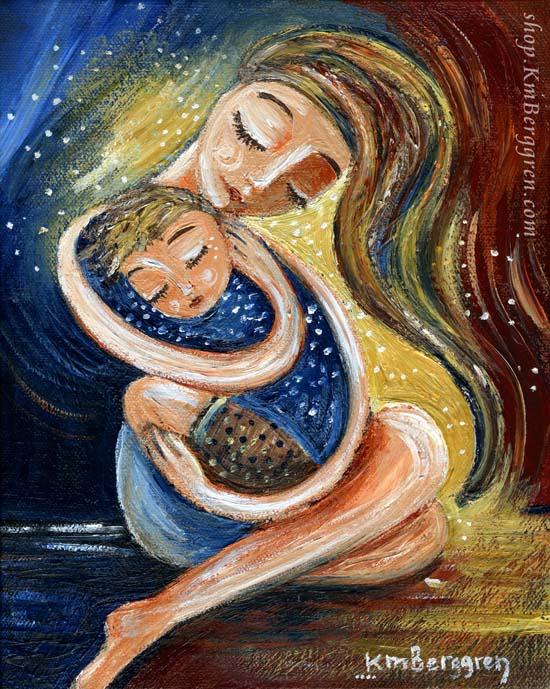
Tsvishn di berg, di grine
[XX sec]
ליריקס און מוזיק / Testo e musica / Lyrics and music / Paroles et musique / Sanat ja sävel:
Mariam Nirenberg
פּערפאָרמער / Interpreti / Performed by / Interprétée par / Laulavat :
Olga Avigail Mieleszczuk
אלבאם / Album: Jewish Folksongs from the Shtetl
La canzone narra di una giovane madre spinta ad annegare la propria creatura nata fuori dal matrimonio. La violenza del gesto si contrappone alla natura circostante benigna nelle sue apparenze, già dal titolo Tra le montagne verdi.
Non avendo trovato una traduzione del testo yiddish non si può aggiungere altro. La canzone e il tema , anzi i temi, ci sembrano molto interessanti. Perciò, se Riccardo Venturi potesse intervenire a colmare la lacuna gliene saremmo grati in tanti. [Riccardo Gullotta]
Nota testuale. Il testo in caratteri ebraici che segue è un testo ricostruito; vale a dire, è arbitrario... (Continues)
[XX sec]
ליריקס און מוזיק / Testo e musica / Lyrics and music / Paroles et musique / Sanat ja sävel:
Mariam Nirenberg
פּערפאָרמער / Interpreti / Performed by / Interprétée par / Laulavat :
Olga Avigail Mieleszczuk
אלבאם / Album: Jewish Folksongs from the Shtetl
La canzone narra di una giovane madre spinta ad annegare la propria creatura nata fuori dal matrimonio. La violenza del gesto si contrappone alla natura circostante benigna nelle sue apparenze, già dal titolo Tra le montagne verdi.
Non avendo trovato una traduzione del testo yiddish non si può aggiungere altro. La canzone e il tema , anzi i temi, ci sembrano molto interessanti. Perciò, se Riccardo Venturi potesse intervenire a colmare la lacuna gliene saremmo grati in tanti. [Riccardo Gullotta]
Nota testuale. Il testo in caratteri ebraici che segue è un testo ricostruito; vale a dire, è arbitrario... (Continues)
צװישן די בערג, די גרינע, [1]
(Continues)
(Continues)
Contributed by Riccardo Gullotta 2021/11/4 - 18:44
ריווקעלע
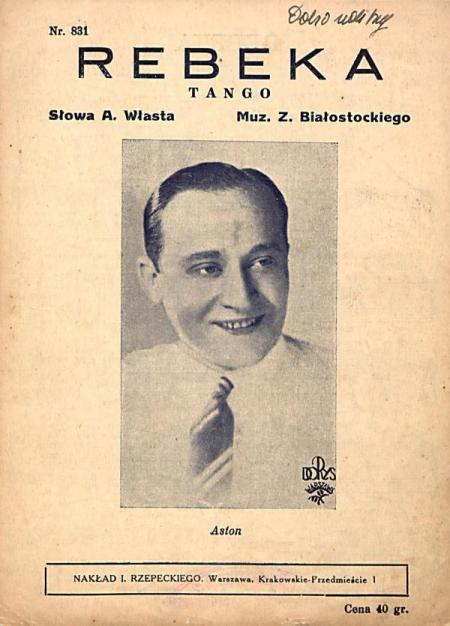
Rivkele
[1932]
מוזיק / Muzyka / Musica / Music / Musique / Sävel:
Zygmunt Białostocki
טעקסט / Testo / Lyrics / Paroles / Sanat:
Unknown
פּערפאָרמער / W wykonaniu / Interprete / Performed by / Interprétée par / Laulaa :
1.
vocal: Olga Avigail
piano: Hadrian Tabęcki
bandoneon: Grzegorz Bożewicz
guitar: Piotr Malicki
2.
vocal: Ola Bilińska
harp : Katarzyna Kolbowska
cello : Edyta Czerniewicz
violin : Julia Ziętek
Roland : Sebastian Witkowski
Polonia e cultura ebraica
Di recente i rapporti tra la popolazione polacca e gli ebrei hanno subito una recrudescenza. Il 12 Agosto 2021 il parlamento polacco ha approvato una legge che di fatto pregiudica agli ebrei sopravvissuti all’Olocausto e ai loro discendenti la possibilità di chiedere la restituzione dei beni a loro confiscati dai nazisti e in seguito dal regime comunista. È l’ultima manifestazione di una intransigenza... (Continues)
[1932]
מוזיק / Muzyka / Musica / Music / Musique / Sävel:
Zygmunt Białostocki
טעקסט / Testo / Lyrics / Paroles / Sanat:
Unknown
פּערפאָרמער / W wykonaniu / Interprete / Performed by / Interprétée par / Laulaa :
1.
vocal: Olga Avigail
piano: Hadrian Tabęcki
bandoneon: Grzegorz Bożewicz
guitar: Piotr Malicki
2.
vocal: Ola Bilińska
harp : Katarzyna Kolbowska
cello : Edyta Czerniewicz
violin : Julia Ziętek
Roland : Sebastian Witkowski
Polonia e cultura ebraica
Di recente i rapporti tra la popolazione polacca e gli ebrei hanno subito una recrudescenza. Il 12 Agosto 2021 il parlamento polacco ha approvato una legge che di fatto pregiudica agli ebrei sopravvissuti all’Olocausto e ai loro discendenti la possibilità di chiedere la restituzione dei beni a loro confiscati dai nazisti e in seguito dal regime comunista. È l’ultima manifestazione di una intransigenza... (Continues)
צום ערשטן מאָל האָט ער איר געזען [1]
(Continues)
(Continues)
Contributed by Riccardo Gullotta 2021/10/22 - 23:11
Song Itineraries:
Bridges, Extermination camps, Fascist and Nazist mass slaughters in Italy and Europe
די בלײַענע פּלאַטן פֿון ראָמס דרוקערײַ
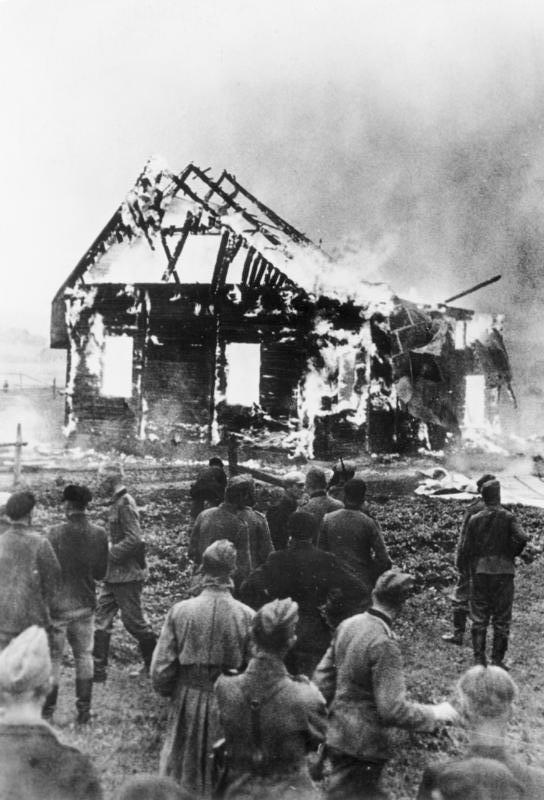
Di blayene platn fun Roms drukeray
[ 1943 ]
ליד / שִׁיר / Poesia / A Poem by / Poésie / قصيدة / Runo:
Avrom Sutskever
מוזיק / לחן / Musica / Music / Musique / موسيقى / Sävel:
Michael Heiser
Vilnius 1941-1944
La resistenza ebraica nel ghetto di Vilna prese il nome di FPO , acronimo di Fareynikte Partizaner Organizatsye , in yiddish פֿאַראײניקטע פּאַרטיזאַנער אָרגאַניזאַציע ossia Organizzazione Partigiana Unita. Entrarono a farne parte cinque componenti: quella comunista che rispondeva a Yitzhak Wittenberg, quella revisionista nota come Betar che raccoglieva i sionisti di destra, referente Josef Glazman, quella socialista Hashomer Hatzair, guidata da Abba Kovner, il movimento scoutista Hanoar Hatzioni guidato da Nissan Reznik, i socialisti del Bund che rispondevano ad Abraham Chwojnik.
L’FPO arrivò a contare 300 membri organizzati in due unità sotto il comando di Glazman e Kovner.... (Continues)
[ 1943 ]
ליד / שִׁיר / Poesia / A Poem by / Poésie / قصيدة / Runo:
Avrom Sutskever
מוזיק / לחן / Musica / Music / Musique / موسيقى / Sävel:
Michael Heiser
Vilnius 1941-1944
La resistenza ebraica nel ghetto di Vilna prese il nome di FPO , acronimo di Fareynikte Partizaner Organizatsye , in yiddish פֿאַראײניקטע פּאַרטיזאַנער אָרגאַניזאַציע ossia Organizzazione Partigiana Unita. Entrarono a farne parte cinque componenti: quella comunista che rispondeva a Yitzhak Wittenberg, quella revisionista nota come Betar che raccoglieva i sionisti di destra, referente Josef Glazman, quella socialista Hashomer Hatzair, guidata da Abba Kovner, il movimento scoutista Hanoar Hatzioni guidato da Nissan Reznik, i socialisti del Bund che rispondevano ad Abraham Chwojnik.
L’FPO arrivò a contare 300 membri organizzati in due unità sotto il comando di Glazman e Kovner.... (Continues)
מיר האָבן װי פֿינגער געשטרעקטע דורך גראַטן [1]
(Continues)
(Continues)
Contributed by Riccardo Gullotta 2021/5/29 - 00:15
Song Itineraries:
Antifa AWS: Militant antifascism, Extermination camps, Ghettos, Rom, Racism, Porrajmos
געזאַנג פֿון אַ יידישן דיכטער אין 1943
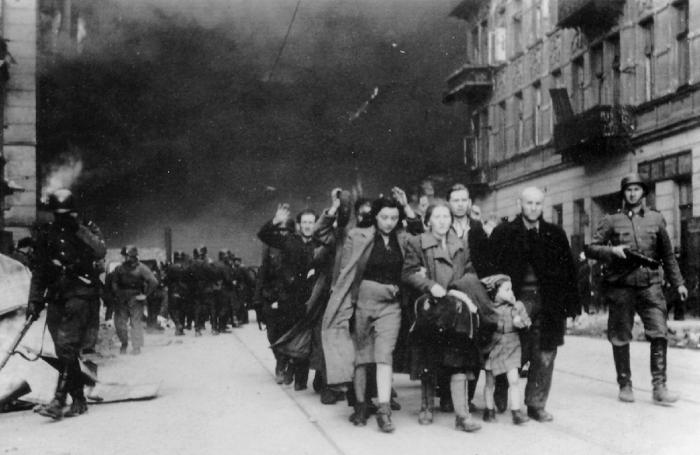
Gezang fun a yidishn dikhter in 1943
[1943]
[1943]
צי בין איך דער לעצטער פּאָעט אין אייראָפּע? [1]
(Continues)
(Continues)
Contributed by Riccardo Venturi 2021/5/27 - 13:03
Song Itineraries:
Extermination camps
שלאָף מײַן קינד, שלאָף כסדר
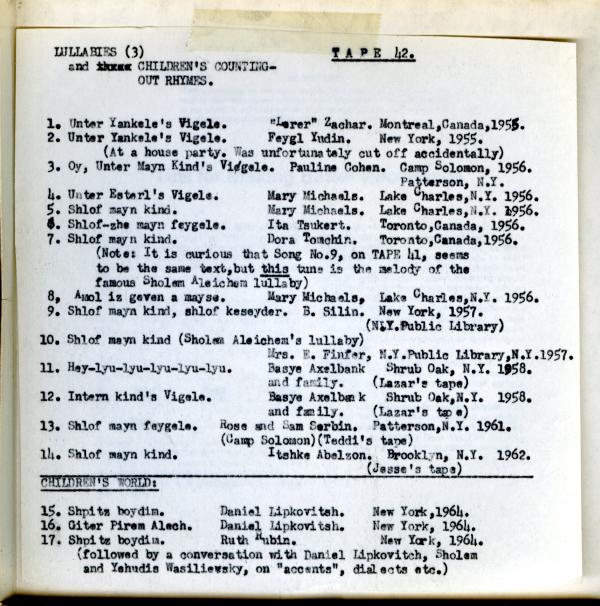
Shlof mayn kind, Shlof keseyder
[ XIX sec ? ]
ליריקס און מוזיק / Testo e musica / Lyrics and music / Paroles et musique / النص والموسيقى / Sanat ja sävel:
אַנאָנימע /Anonimo / Anonymous / Anonyme / مجهول / Nimeämätön
פּערפאָרמער / Interpreti / Performed by / Interprétée par / مطرب / Laulavat :
1. Paul Robeson
אלבאם / Album /الألبوم : Shlof, Mein Kind (Sleep, My Child)
2. Tania Solnik
אלבאם / Album /الألبوم :From Generation To Generation: A Legacy Of Lullabies [1993]
La vig lid [ ninna nanna ] Shlof mayn kind, Shlof keseyder fu riscoperta da Ruth Rubin. E’ riportata nel suo libro postumo Yiddish Folksongs from the Ruth Rubin Archive. Nella sua raccolta di 2000 canti yiddish, raccolti con cura per un quarantennio, questa struggente ninnananna fu registrata nel nastro n. 42
Ruth si trovò spesso a partecipare ai concerti folk anche con Paul Robeson.
L’interpretazione di... (Continues)
[ XIX sec ? ]
ליריקס און מוזיק / Testo e musica / Lyrics and music / Paroles et musique / النص والموسيقى / Sanat ja sävel:
אַנאָנימע /Anonimo / Anonymous / Anonyme / مجهول / Nimeämätön
פּערפאָרמער / Interpreti / Performed by / Interprétée par / مطرب / Laulavat :
1. Paul Robeson
אלבאם / Album /الألبوم : Shlof, Mein Kind (Sleep, My Child)
2. Tania Solnik
אלבאם / Album /الألبوم :From Generation To Generation: A Legacy Of Lullabies [1993]
La vig lid [ ninna nanna ] Shlof mayn kind, Shlof keseyder fu riscoperta da Ruth Rubin. E’ riportata nel suo libro postumo Yiddish Folksongs from the Ruth Rubin Archive. Nella sua raccolta di 2000 canti yiddish, raccolti con cura per un quarantennio, questa struggente ninnananna fu registrata nel nastro n. 42
Ruth si trovò spesso a partecipare ai concerti folk anche con Paul Robeson.
L’interpretazione di... (Continues)
שלאָף מײַן קינד, שלאָף כסדר [1]
(Continues)
(Continues)
Contributed by Riccardo Gullotta 2021/1/29 - 20:22
שלאָף אין זיסער רו
Anonymous

Shlof in ziser ru
[ XIX sec ? ]
ליריקס און מוזיק / Testo e musica / Lyrics and music / Paroles et musique / النص والموسيقى / Sanat ja sävel:
אַנאָנימע / Anonimo / Anonymous / Anonyme / مجهول / Nimeämätön
עריינדזשד דורך / Arrangiamento / Arranged by / Arrangé par / منظم / Järjestäjä :
Yossele Rosenblatt [יאסעלע ראזענבלאט]
פּערפאָרמער / Interpreti / Performed by / Interprétée par / مطرب / Laulavat :
1. Yifeat Ziv
2. Yossele Rosenblatt [ יאסעלע ראזענבלאט]
אלבאם / Album /الألبوم : Best Yiddish Songs [2008]
• Artista nigeriano , età 46 anni
[ XIX sec ? ]
ליריקס און מוזיק / Testo e musica / Lyrics and music / Paroles et musique / النص والموسيقى / Sanat ja sävel:
אַנאָנימע / Anonimo / Anonymous / Anonyme / مجهول / Nimeämätön
עריינדזשד דורך / Arrangiamento / Arranged by / Arrangé par / منظم / Järjestäjä :
Yossele Rosenblatt [יאסעלע ראזענבלאט]
פּערפאָרמער / Interpreti / Performed by / Interprétée par / مطرب / Laulavat :
1. Yifeat Ziv
2. Yossele Rosenblatt [ יאסעלע ראזענבלאט]
אלבאם / Album /الألبوم : Best Yiddish Songs [2008]
• Artista nigeriano , età 46 anni
אײַ לי לו לי לו, אײַ לי לו לי לו[1]
(Continues)
(Continues)
Contributed by Riccardo Gullotta 2021/1/10 - 23:07
לאָמיר זיך איבערבעטן
Anonymous
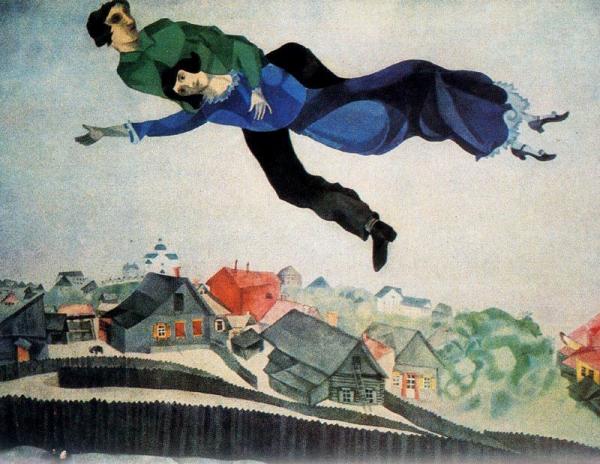
Lomir zikh iberbetn
[ XX sec ]
און מוזיק / Testo e musica / Lyrics and music / Paroles et musique / النص والموسيقى / Sanat ja sävel:
אַנאָנימע /Anonimo / Anonymous / Anonyme / مجهول / Nimeämätön
פּערפאָרמער / Interpreti / Performed by / Interprétée par / مطرب / Laulavat :
1. Zupfgeigenhansel
אלבאם / Album /الألبوم : Jiddische Lieder [1979]
2. Ben Zimet
אלבאם / Album /الألبوم : Chants Yiddish [1974]
3. Ruth Rubin , Pete Seeger
אלבאם / Album /الألبوم : Jewish, Children's Songs & Games [1957]
4. Talila
אלבאם / Album /الألبوم : Chants Yiddish [1977]
E’ un lid yiddish di origine russa. La prima pubblicazione di cui si ha notizia risale al 1914. C’è anche un’altra versione di Yossele Rosenblatt in chiave religiosa.
Nota testuale
La struttura della canzone varia in base alle interpretazioni. Per darne conto le strofe sono contrassegnate con una lettera. La successione... (Continues)
[ XX sec ]
און מוזיק / Testo e musica / Lyrics and music / Paroles et musique / النص والموسيقى / Sanat ja sävel:
אַנאָנימע /Anonimo / Anonymous / Anonyme / مجهول / Nimeämätön
פּערפאָרמער / Interpreti / Performed by / Interprétée par / مطرب / Laulavat :
1. Zupfgeigenhansel
אלבאם / Album /الألبوم : Jiddische Lieder [1979]
2. Ben Zimet
אלבאם / Album /الألبوم : Chants Yiddish [1974]
3. Ruth Rubin , Pete Seeger
אלבאם / Album /الألبوم : Jewish, Children's Songs & Games [1957]
4. Talila
אלבאם / Album /الألبوم : Chants Yiddish [1977]
E’ un lid yiddish di origine russa. La prima pubblicazione di cui si ha notizia risale al 1914. C’è anche un’altra versione di Yossele Rosenblatt in chiave religiosa.
Nota testuale
La struttura della canzone varia in base alle interpretazioni. Per darne conto le strofe sono contrassegnate con una lettera. La successione... (Continues)
[1] לאָמיר זיך איבערבעטן איבערבעטן (d)
(Continues)
(Continues)
Contributed by Riccardo Gullotta 2021/1/6 - 23:02
טומבאַ טומבאַ
Anonymous
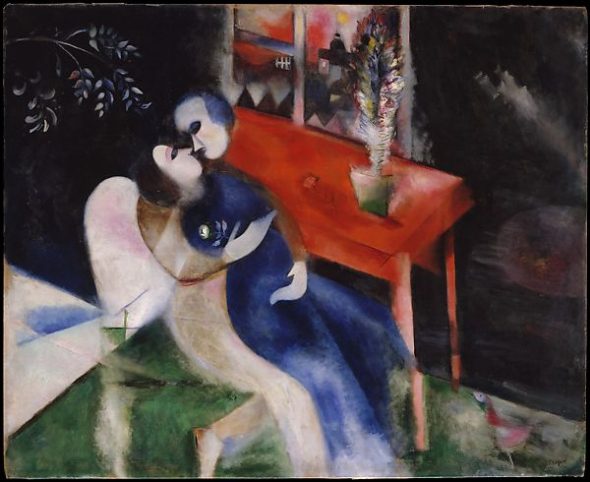
Tumba Tumba
[ XIX sec ? ]
ליריקס און מוזיק / Testo e musica / Lyrics and music / Paroles et musique / النص والموسيقى / Sanat ja sävel:
אַנאָנימע /Anonimo / Anonymous / Anonyme / مجهول / Nimeämätön
פּערפאָרמער / Interpreti / Performed by / Interprétée par / مطرب / Laulavat :
1. Mark Olf *
אלבאם / Album /الألبوم :
Mark Olf [1961]
2. Martha Schlamme
אלבאם / Album / الألبوم :
Raisins And Almonds And Other Jewish Folk Songs [ 1967 ]
3.Klezmertanz Karlsruhe
* Mark Olf
Mark Olf (1905–1987) è stato un compositore e cantante di canzoni yiddish ed ebraiche. Emigrò dalla Russia negli Stati Uniti con la sua famiglia quando era ancora adolescente; in seguito registrò alcune delle canzoni che aveva sentito da bambino, girò per il paese esibendosi e insegnò musica all'Henry Street Settlement nel Lower East Side, al Queens College (CUNY) e all'Università di Rhode Island.
Cultura... (Continues)
[ XIX sec ? ]
ליריקס און מוזיק / Testo e musica / Lyrics and music / Paroles et musique / النص والموسيقى / Sanat ja sävel:
אַנאָנימע /Anonimo / Anonymous / Anonyme / مجهول / Nimeämätön
פּערפאָרמער / Interpreti / Performed by / Interprétée par / مطرب / Laulavat :
1. Mark Olf *
אלבאם / Album /الألبوم :
Mark Olf [1961]
2. Martha Schlamme
אלבאם / Album / الألبوم :
Raisins And Almonds And Other Jewish Folk Songs [ 1967 ]
3.Klezmertanz Karlsruhe
* Mark Olf
Mark Olf (1905–1987) è stato un compositore e cantante di canzoni yiddish ed ebraiche. Emigrò dalla Russia negli Stati Uniti con la sua famiglia quando era ancora adolescente; in seguito registrò alcune delle canzoni che aveva sentito da bambino, girò per il paese esibendosi e insegnò musica all'Henry Street Settlement nel Lower East Side, al Queens College (CUNY) e all'Università di Rhode Island.
Cultura... (Continues)
[1]אויפֿן אויוון זיצט אַ מיידל,
(Continues)
(Continues)
Contributed by Riccardo Gullotta 2021/1/4 - 19:36
שלאָף מײַן קינד
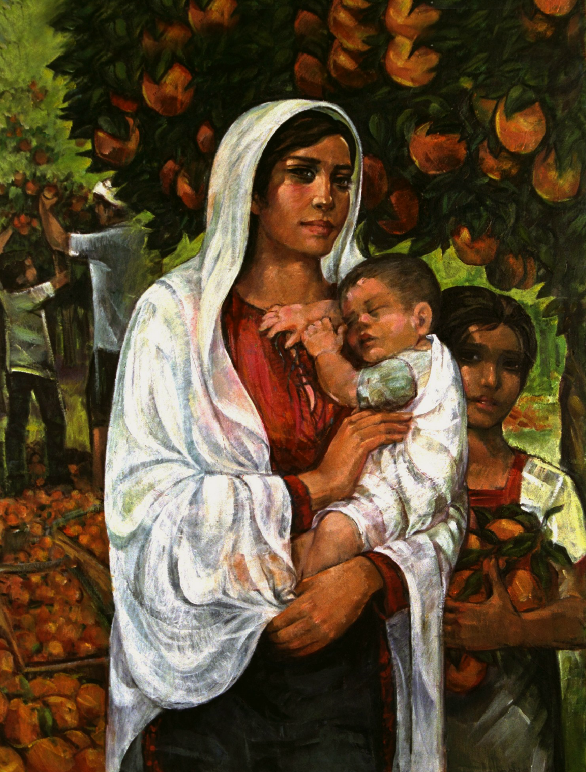
Shlof mayn kind
[1892]
ליריקס / Testo / Lyrics / Paroles / متن ترانه / Sanat:
Sholem Aleichem [שלום עליכם]
מוזיק / Musica / Music / Musique / موسیقی / Sävel:
Dovid Kovanovsky
1. פּערפאָרמער / Interpreti / Performed by / Interprétée par / مطرب / Laulavat :
Inna Barmash
אלבאם / Album / الألبوم :
Yiddish Lullabies & Love Songs [2013]
2. פּערפאָרמער / Interpreti / Performed by / Interprétée par / مطرب / Laulavat :
Lucette Van Den Berg
אלבאם / Album / الألبوم :
Shlof mayn kind [2020]
Dall’enciclopedia Yivo:
The lullaby “Shlof mayn kind” (Sleep my child) by Sholem Aleichem, first printed in Odessa in 1892, became folklorized by 1901, after it was submitted to collectors with changes by five individuals from different localities.
Parlando di canzoni folk Yiddish non si può fare a meno di tributare una menzione a Ruth Rubin. Dobbiamo a lei la diffusione anche di questa... (Continues)
[1892]
ליריקס / Testo / Lyrics / Paroles / متن ترانه / Sanat:
Sholem Aleichem [שלום עליכם]
מוזיק / Musica / Music / Musique / موسیقی / Sävel:
Dovid Kovanovsky
1. פּערפאָרמער / Interpreti / Performed by / Interprétée par / مطرب / Laulavat :
Inna Barmash
אלבאם / Album / الألبوم :
Yiddish Lullabies & Love Songs [2013]
2. פּערפאָרמער / Interpreti / Performed by / Interprétée par / مطرب / Laulavat :
Lucette Van Den Berg
אלבאם / Album / الألبوم :
Shlof mayn kind [2020]
Dall’enciclopedia Yivo:
The lullaby “Shlof mayn kind” (Sleep my child) by Sholem Aleichem, first printed in Odessa in 1892, became folklorized by 1901, after it was submitted to collectors with changes by five individuals from different localities.
Parlando di canzoni folk Yiddish non si può fare a meno di tributare una menzione a Ruth Rubin. Dobbiamo a lei la diffusione anche di questa... (Continues)
שלאָף, מייַן קינד, מייַן קרוין, מייַן שיינער, [1]
(Continues)
(Continues)
Contributed by Riccardo Gullotta 2020/12/28 - 22:00
דאָרטן דאָרטן איבערן װאסערל
Anonymous
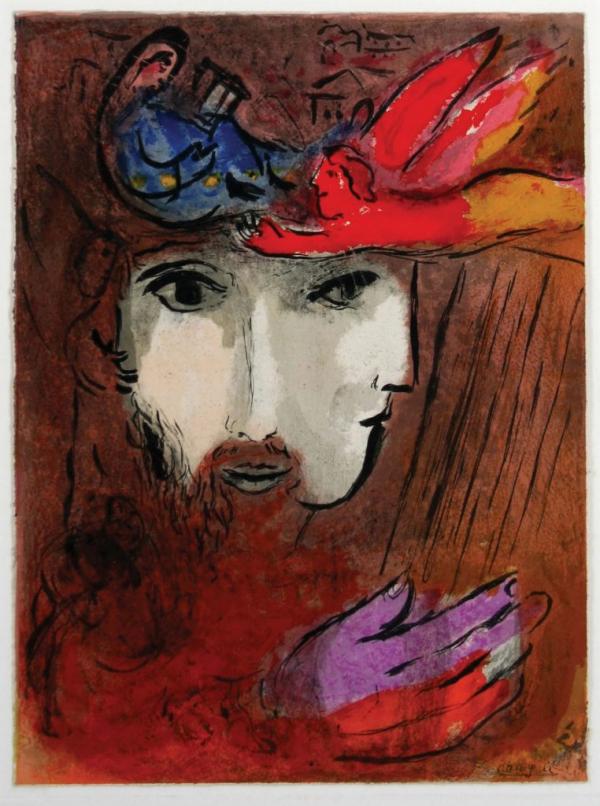
Dortn, dortn, ibern vaserl
[XIX sec ]
ליריקס און מוזיק / Testo e musica / Lyrics and music / Paroles et musique / Sanat ja sävel:
אַנאָנימע /Anonimo / Anonymous / Anonyme / Nimeämätön
פּערפאָרמער / Interpreti / Performed by / Interprétée par / Laulavat :
1. Norbert Horowitz *
אלבאם / Album :
Songs From The Wall [ 1961 ]
2. Ruth Rubin [ רות רובין ]
אלבאם / Album :
Yiddish Folk Songs Sung By Ruth Rubin [ 1978 ]
3. Zupfgeigenhansel
אלבאם / Album :
Jiddische Lieder [ 1979 ]
*Un tributo a Norbert Horowitz
Norbert Horowitz, marito di Rita Karin, fondò nel dopoguerra un teatro itinerante in lingua yiddish per i sopravvissuti dell’Olocausto. Fu l’autore di un importante saggio, ייִדיש טעאַטער פֿון דער שאריס־האַפּליטא [Yidish teater fun der sharis-haplita ] / Il teatro yiddish tra i sopravvissuti .
Rita Karin era un’attrice polacca i cui genitori furono vittime dell’Olocausto.... (Continues)
[XIX sec ]
ליריקס און מוזיק / Testo e musica / Lyrics and music / Paroles et musique / Sanat ja sävel:
אַנאָנימע /Anonimo / Anonymous / Anonyme / Nimeämätön
פּערפאָרמער / Interpreti / Performed by / Interprétée par / Laulavat :
1. Norbert Horowitz *
אלבאם / Album :
Songs From The Wall [ 1961 ]
2. Ruth Rubin [ רות רובין ]
אלבאם / Album :
Yiddish Folk Songs Sung By Ruth Rubin [ 1978 ]
3. Zupfgeigenhansel
אלבאם / Album :
Jiddische Lieder [ 1979 ]
*Un tributo a Norbert Horowitz
Norbert Horowitz, marito di Rita Karin, fondò nel dopoguerra un teatro itinerante in lingua yiddish per i sopravvissuti dell’Olocausto. Fu l’autore di un importante saggio, ייִדיש טעאַטער פֿון דער שאריס־האַפּליטא [Yidish teater fun der sharis-haplita ] / Il teatro yiddish tra i sopravvissuti .
Rita Karin era un’attrice polacca i cui genitori furono vittime dell’Olocausto.... (Continues)
[1]אוי, דאָרטן, דאָרטן איבערן װאסערַל,
(Continues)
(Continues)
Contributed by Riccardo Gullotta 2020/11/16 - 19:47
מענטשן־פרעסער

mentshn-freser
[ 1916 ]
ליריקס און מוזיק / Testo e musica / Lyrics and music / Paroles et musique / Sanat ja sävel
Solomon Smulewitz
פּערפאָרמער / Interpreti / Performed by / Interprétée par / Laulavat /
Sveta Kundish & Daniel Kahn
In memoria di Luciana, madre di Riccardo Venturi
[ 1916 ]
ליריקס און מוזיק / Testo e musica / Lyrics and music / Paroles et musique / Sanat ja sävel
Solomon Smulewitz
פּערפאָרמער / Interpreti / Performed by / Interprétée par / Laulavat /
Sveta Kundish & Daniel Kahn
In memoria di Luciana, madre di Riccardo Venturi
גאָר אַ שרעקלעכע מגפֿה [1]
(Continues)
(Continues)
Contributed by Riccardo Gullotta 2020/11/11 - 20:38
Song Itineraries:
2020-2023: COVID-19 Songbook
רויטע עפּל, גרינע שאָטנס
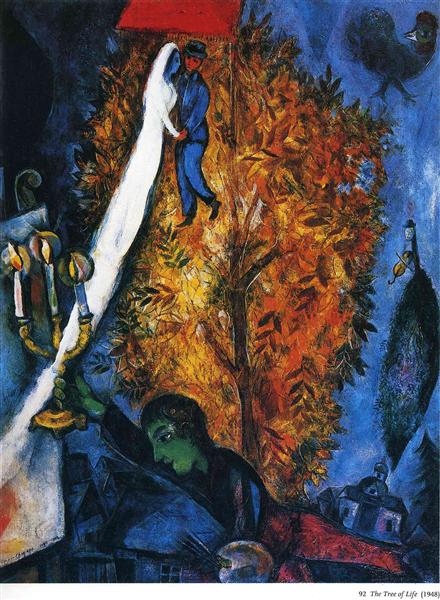
Royte epl, grine shotns
[ 1906 ]
פּאָעזיע / Poesia / A Poem by / Poésie/ شعر / Runo:
Zalman Schneour /זלמן שניאור
מוזיק / Musica / Music / Musique / موسيقى / Sävel:
Samuel Bugatch
פּערפאָרמער / Interpreti / Performed by / Interprétée par / مترجمين / Laulaa:
Jacob Gorelik
È una poesia dal volume Fertsik yor lider un poemen / Quarant’anni di lider e poesie del poeta bielorusso ebreo Zalman Schneour, pubblicata a Vilna nel 1906.
Nei primi anni del Novecento Vilna fu uno dei centri propulsori della cultura yiddish. Su circa 180.000 abitanti 75.000 erano ebrei, 60.000 polacchi, 35.000 russi, 8.000 bielorussi e appena 4.000 lituani. La tolleranza a Vilnius era la regola, un retaggio della Repubblica polacco-lituana cessata un secolo prima. La rivoluzione del 1905 in Russia ebbe effetti positivi per il governatorato lituano. Con la I guerra mondiale la situazione precipitò: la Lituania subì le mire espansioniste di tedeschi, polacchi e russi con effetti devastanti.
[Riccardo Gullotta]
[ 1906 ]
פּאָעזיע / Poesia / A Poem by / Poésie/ شعر / Runo:
Zalman Schneour /זלמן שניאור
מוזיק / Musica / Music / Musique / موسيقى / Sävel:
Samuel Bugatch
פּערפאָרמער / Interpreti / Performed by / Interprétée par / مترجمين / Laulaa:
Jacob Gorelik
È una poesia dal volume Fertsik yor lider un poemen / Quarant’anni di lider e poesie del poeta bielorusso ebreo Zalman Schneour, pubblicata a Vilna nel 1906.
Nei primi anni del Novecento Vilna fu uno dei centri propulsori della cultura yiddish. Su circa 180.000 abitanti 75.000 erano ebrei, 60.000 polacchi, 35.000 russi, 8.000 bielorussi e appena 4.000 lituani. La tolleranza a Vilnius era la regola, un retaggio della Repubblica polacco-lituana cessata un secolo prima. La rivoluzione del 1905 in Russia ebbe effetti positivi per il governatorato lituano. Con la I guerra mondiale la situazione precipitò: la Lituania subì le mire espansioniste di tedeschi, polacchi e russi con effetti devastanti.
[Riccardo Gullotta]
רויטע עפּל, גרינע שאָטנס,[1]
(Continues)
(Continues)
Contributed by Riccardo Gullotta 2020/8/28 - 17:40
זאָג מאַראַן
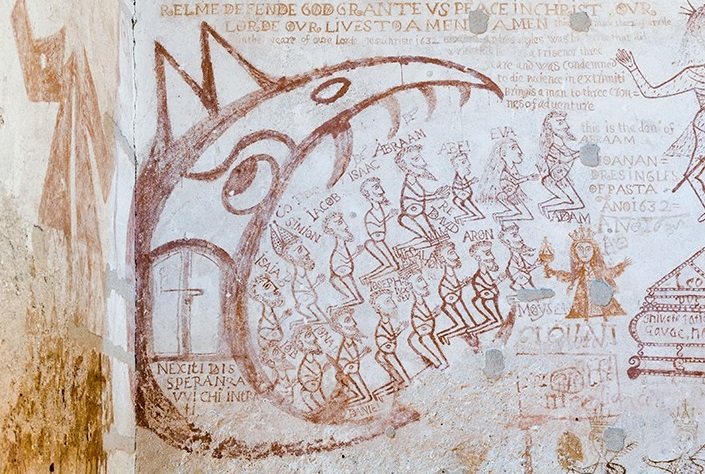
Zog maran
[ 1963 ]
פּאָעזיע / Poesia / A Poem by / Poésie/ شعر / Runo:
אברהם רייזן [Avrom Reyzen]
מוזיק/ Musica / Music / Musique / موسيقى / Sävel:
Samuel Bugatch
פּערפאָרמער/ Interpreti / Performed by / Interprétée par / مترجمين / Laulavat:
Vocolot
אלבאם / Album:
Heart Beat
יִרְמְיָהוּ
וַֽאֲנִ֕י כְּכֶ֥בֶשׂ אַלּ֖וּף יוּבַ֣ל לִטְבּ֑וֹחַ וְלֹֽא־יָדַ֜עְתִּי כִּֽי־עָלַ֣י |
חָֽשְׁב֣וּ מַֽחֲשָׁב֗וֹת נַשְׁחִ֨יתָה עֵ֚ץ בְּלַחְמוֹ֙ וְנִכְרְתֶ֙נּוּ֙ מֵאֶ֣רֶץ
חַיִּ֔ים וּשְׁמ֖וֹ לֹֽא־יִזָּכֵ֥ר עֽוֹד:
Geremia 11,19
Ero come un agnello mansueto che viene portato al macello,
non sapevo che essi tramavano contro di me dicendo:
"Abbattiamo l'albero nel suo rigoglio,
strappiamolo dalla terra dei viventi; che il suo nome non sia più ricordato”.
I Marrani
Marranos nella Spagna medievale furono chiamati in senso spregiativo gli ebrei convertiti al cristianesimo e la loro discendenza.... (Continues)
[ 1963 ]
פּאָעזיע / Poesia / A Poem by / Poésie/ شعر / Runo:
אברהם רייזן [Avrom Reyzen]
מוזיק/ Musica / Music / Musique / موسيقى / Sävel:
Samuel Bugatch
פּערפאָרמער/ Interpreti / Performed by / Interprétée par / مترجمين / Laulavat:
Vocolot
אלבאם / Album:
Heart Beat
יִרְמְיָהוּ
וַֽאֲנִ֕י כְּכֶ֥בֶשׂ אַלּ֖וּף יוּבַ֣ל לִטְבּ֑וֹחַ וְלֹֽא־יָדַ֜עְתִּי כִּֽי־עָלַ֣י |
חָֽשְׁב֣וּ מַֽחֲשָׁב֗וֹת נַשְׁחִ֨יתָה עֵ֚ץ בְּלַחְמוֹ֙ וְנִכְרְתֶ֙נּוּ֙ מֵאֶ֣רֶץ
חַיִּ֔ים וּשְׁמ֖וֹ לֹֽא־יִזָּכֵ֥ר עֽוֹד:
Geremia 11,19
Ero come un agnello mansueto che viene portato al macello,
non sapevo che essi tramavano contro di me dicendo:
"Abbattiamo l'albero nel suo rigoglio,
strappiamolo dalla terra dei viventi; che il suo nome non sia più ricordato”.
I Marrani
Marranos nella Spagna medievale furono chiamati in senso spregiativo gli ebrei convertiti al cristianesimo e la loro discendenza.... (Continues)
זאָג מאַראַן דו ברודער מײַנער[1]
(Continues)
(Continues)
Contributed by Riccardo Gullotta 2020/8/26 - 18:22
טרעבלינקע דאָרט
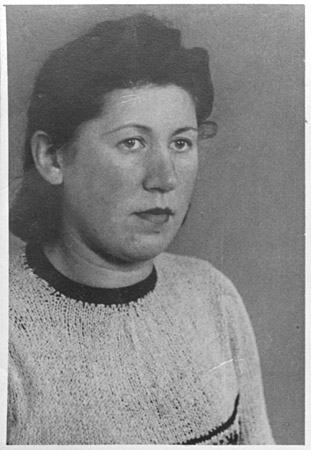
Treblinke dort
[1943]
“Mi chiamo Frieda Radasky. Sono nata a Varsavia, in Polonia, e sono sopravvissuta al regime nazista durante la II guerra mondiale. Quando stavo nel ghetto di Varsavia, c'era una canzone popolare che descriveva l'orribile tragedia che stavano subendo gli Ebrei di Varsavia. Parlava di come le famiglie venivano portate alla Umschlagplatz tra il terrore e le grida, poiché sapevano che, una volta portati a Treblinka, non sarebbero mai ritornati.”
Nel 1943, Frieda Bursztyn Radasky lavorava nelle cucine di un deposito di carbone in un distretto di Varsavia situato all'esterno del Ghetto; il distretto si chiama, curiosamente, Praga. Le lavoratrici nelle cucine erano tutte giovani donne; da quel posto, potevano assistere quotidianamente alla deportazione di centinaia di ebrei dal Ghetto; molti dei deportati credevano (o volevano credere) alla propaganda nazista secondo la... (Continues)
[1943]
“Mi chiamo Frieda Radasky. Sono nata a Varsavia, in Polonia, e sono sopravvissuta al regime nazista durante la II guerra mondiale. Quando stavo nel ghetto di Varsavia, c'era una canzone popolare che descriveva l'orribile tragedia che stavano subendo gli Ebrei di Varsavia. Parlava di come le famiglie venivano portate alla Umschlagplatz tra il terrore e le grida, poiché sapevano che, una volta portati a Treblinka, non sarebbero mai ritornati.”
Nel 1943, Frieda Bursztyn Radasky lavorava nelle cucine di un deposito di carbone in un distretto di Varsavia situato all'esterno del Ghetto; il distretto si chiama, curiosamente, Praga. Le lavoratrici nelle cucine erano tutte giovani donne; da quel posto, potevano assistere quotidianamente alla deportazione di centinaia di ebrei dal Ghetto; molti dei deportati credevano (o volevano credere) alla propaganda nazista secondo la... (Continues)
עס איז אַ שטורם דורך די װעלט איז אױפֿגעגאַנגען, [1]
(Continues)
(Continues)
Contributed by Riccardo Venturi 2020/7/28 - 07:57
Song Itineraries:
Extermination camps
דאָס זאַנגל
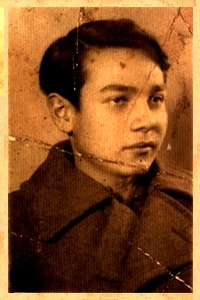
Dos zangl
[1943]
Parole / Lyrics / Paroles / Sanat: Hirsh Glik
Musica / Music / Musique / Sävel: Melodia popolare polacca / Polish folk tune / Mélodie populaire polonaise
Hirsh Glik -il cui cognome significa in yiddish, come il tedesco Glück, "fortuna"-, nato a Vilnius il 24 aprile 1922, verrà ricordato per sempre come l'autore di ciò che è diventato l'inno della Resistenza ebraica nei ghetti dell'Europa orientale: Zog nit keynmol. Ricordato? Chissà; si tratta di uno dei canti, probabilmente, più famosi della Storia intera, talmente famoso da averne (almeno in parte) oscurato l'autore. Hirsh Glik ebbe un'esistenza brevissima; la sua povera famiglia del ghetto di Vilnius (il padre era un modestissimo commerciante di vestiti usati) fu catturata dai nazisti nel 1941 e scomparve interamente. Hirsh fu deportato in un campo di lavori forzati in Polonia, Biała Waka, un'immensa torbiera in una... (Continues)
[1943]
Parole / Lyrics / Paroles / Sanat: Hirsh Glik
Musica / Music / Musique / Sävel: Melodia popolare polacca / Polish folk tune / Mélodie populaire polonaise
Hirsh Glik -il cui cognome significa in yiddish, come il tedesco Glück, "fortuna"-, nato a Vilnius il 24 aprile 1922, verrà ricordato per sempre come l'autore di ciò che è diventato l'inno della Resistenza ebraica nei ghetti dell'Europa orientale: Zog nit keynmol. Ricordato? Chissà; si tratta di uno dei canti, probabilmente, più famosi della Storia intera, talmente famoso da averne (almeno in parte) oscurato l'autore. Hirsh Glik ebbe un'esistenza brevissima; la sua povera famiglia del ghetto di Vilnius (il padre era un modestissimo commerciante di vestiti usati) fu catturata dai nazisti nel 1941 e scomparve interamente. Hirsh fu deportato in un campo di lavori forzati in Polonia, Biała Waka, un'immensa torbiera in una... (Continues)
בלאָנד ביסטו װי אַ זאַנגל, [1]
(Continues)
(Continues)
Contributed by Riccardo Venturi 2020/7/27 - 21:50
Song Itineraries:
Anti War Love Songs, Extermination camps
די װראָנע [אױף די גרינע פעלדער, װעלדער]
![די װראָנע [אױף די גרינע פעלדער, װעלדער]](img/upl/alelider.jpg)
Di vrone [Oyf di grine felder, velder]
Oyf di Grine Felder un Velder (In Green Fields and Forests) :: Sara Nomberg-Przytyk ~Yiddish~ mi segnala Wolf Krakowski
qui testo e traduzione [Lorenzo Masetti]
Hello Lorenzo:
I recently uploaded 11 videos of Sara Nomberg-Przytyk singing in Yiddish, I videotaped on 1986. Included is the anti-war song from WWI, Unter di Grine Felder und Velder. (In the Green Fields and Forests).
It, and 10 others are on my Wolf Krakowski You Tube channel. Check it out.
BTW Sara, as a prisoner, was Mengele’s secretary in Auschwitz.
Read about her life on encyclopedia and on Wikipedia.
Through my my friendship with her son, she was like an auntie to me . . .
Auguri,
Wolf Krakowski
Northampton, MA, USA
A WW1-inspired song by Mordkhe Gebirtig movingly sung by Sara Nomberg-Przytyk and reported by Wolf Krakowski to our site webmaster, Lorenzo Masetti. Though... (Continues)
Oyf di Grine Felder un Velder (In Green Fields and Forests) :: Sara Nomberg-Przytyk ~Yiddish~ mi segnala Wolf Krakowski
qui testo e traduzione [Lorenzo Masetti]
Hello Lorenzo:
I recently uploaded 11 videos of Sara Nomberg-Przytyk singing in Yiddish, I videotaped on 1986. Included is the anti-war song from WWI, Unter di Grine Felder und Velder. (In the Green Fields and Forests).
It, and 10 others are on my Wolf Krakowski You Tube channel. Check it out.
BTW Sara, as a prisoner, was Mengele’s secretary in Auschwitz.
Read about her life on encyclopedia and on Wikipedia.
Through my my friendship with her son, she was like an auntie to me . . .
Auguri,
Wolf Krakowski
Northampton, MA, USA
A WW1-inspired song by Mordkhe Gebirtig movingly sung by Sara Nomberg-Przytyk and reported by Wolf Krakowski to our site webmaster, Lorenzo Masetti. Though... (Continues)
אױף די גרינע פעלדער, װעלדער, װעי אַך װעי, [1]
(Continues)
(Continues)
Contributed by CCG/AWS Staff 2020/5/7 - 18:20
Song Itineraries:
World War I (1914-1918)
טום־באַלאַלײַקע
Anonymous
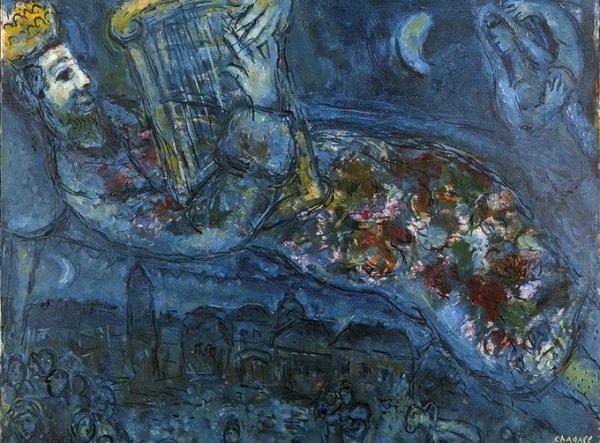
Tum-balalayke
[XIX secolo]
Anonimo
Introduzione
E’ un brano popolare della cultura ebrea ashkenazita. Le sue origini risalgono al XIX secolo nell’Europa orientale. Rimase pressoché sconosciuto ai più sino al 1940. Nel 1957 Pete Seeger lo inserì nel disco “Jewish Songs and Games” in un duetto con Ruth Rubin. Maggiore diffusione ebbe grazie a Theodore Bikel, grande attore ebreo e cantante. La sua incisione è del 1960.
Da allora la canzone ha valicato gli ambiti della cultura ebraica per acquisire popolarità a livello internazionale. È entrata a far parte della colonna sonora del film di Roberto Faenza del 2002 “Prendimi l’anima”. La melodia infatti non è affatto banale, rivela un’ intensità apparentemente inattesa. In realtà ciò non sorprende più di tanto se si vanno ad approfondire sviluppi ed espressioni della cultura ebraica nell’Europa dell’Est dal Settecento in poi.
Narra di un... (Continues)
[XIX secolo]
Anonimo
Introduzione
E’ un brano popolare della cultura ebrea ashkenazita. Le sue origini risalgono al XIX secolo nell’Europa orientale. Rimase pressoché sconosciuto ai più sino al 1940. Nel 1957 Pete Seeger lo inserì nel disco “Jewish Songs and Games” in un duetto con Ruth Rubin. Maggiore diffusione ebbe grazie a Theodore Bikel, grande attore ebreo e cantante. La sua incisione è del 1960.
Da allora la canzone ha valicato gli ambiti della cultura ebraica per acquisire popolarità a livello internazionale. È entrata a far parte della colonna sonora del film di Roberto Faenza del 2002 “Prendimi l’anima”. La melodia infatti non è affatto banale, rivela un’ intensità apparentemente inattesa. In realtà ciò non sorprende più di tanto se si vanno ad approfondire sviluppi ed espressioni della cultura ebraica nell’Europa dell’Est dal Settecento in poi.
Narra di un... (Continues)
1.
(Continues)
(Continues)
Contributed by Riccardo Gullotta 2020/1/2 - 23:03
Song Itineraries:
Extermination camps, From olden times: Songs against war, inside war, around war
דאָס פֿערצנטע יאָר
Anonymous
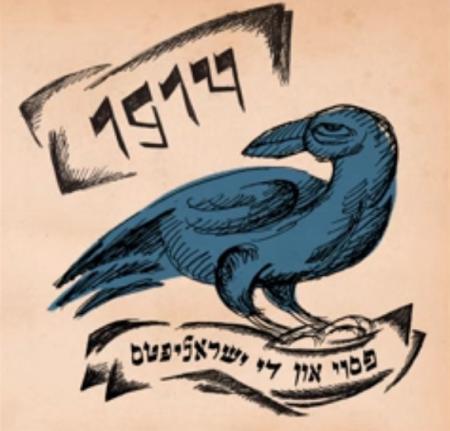
Dos fertsnte yor
Una canzone popolare in yiddish (di provenienza quasi certamente polacca, nota anche come Oyf di grine felder, velder) sulla morte di un soldato ebreo nella „grande guerra“. Uno dei tanti. E' la centesima canzone in yiddish inserita in questo sito: lo yiddish è la diciottesima lingua che raggiunge tale traguardo. Una sezione linguistica, del resto, persino più importante della sua oramai ragguardevole consistenza quantitativa.
La canzone presenta parecchie varianti. Il testo che segue è ripreso da Yidlid – Yidishe Lider e proviene in gran parte dal libro Yidishe folks-lider, compilato da Beregovsky e Fefer e pubblicato a Kiev nel 1938, con l'aggiunta di alcune strofe riprese da altre versioni. Secondo Gertrude Schneider, l'autrice di Mordechai Gebirtig, His poetic and musical legacy]] (pp. 4/5), esiste la possibilità che la canzone sia stata scritta da Mordechai Gebirtig:... (Continues)
Una canzone popolare in yiddish (di provenienza quasi certamente polacca, nota anche come Oyf di grine felder, velder) sulla morte di un soldato ebreo nella „grande guerra“. Uno dei tanti. E' la centesima canzone in yiddish inserita in questo sito: lo yiddish è la diciottesima lingua che raggiunge tale traguardo. Una sezione linguistica, del resto, persino più importante della sua oramai ragguardevole consistenza quantitativa.
La canzone presenta parecchie varianti. Il testo che segue è ripreso da Yidlid – Yidishe Lider e proviene in gran parte dal libro Yidishe folks-lider, compilato da Beregovsky e Fefer e pubblicato a Kiev nel 1938, con l'aggiunta di alcune strofe riprese da altre versioni. Secondo Gertrude Schneider, l'autrice di Mordechai Gebirtig, His poetic and musical legacy]] (pp. 4/5), esiste la possibilità che la canzone sia stata scritta da Mordechai Gebirtig:... (Continues)
דאָס פֿערצנטע יאָר איז אָנגעקומען, אוי וויי [1]
(Continues)
(Continues)
Contributed by Riccardo Venturi 2019/11/29 - 09:23
Song Itineraries:
World War I (1914-1918)
דירע־געלט
Anonymous
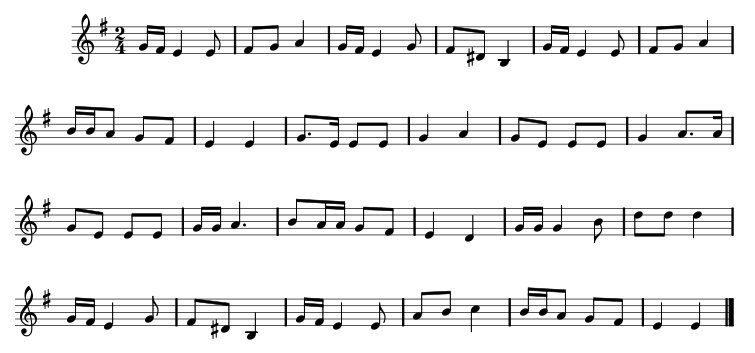
Dire-gelt
[XIX secolo / 19th century]
Canzone popolare yiddish di provenienza russa
Yiddish folksong of Russian origin
Chanson populaire yiddish d'origine russe
Canzone popolare yiddish di provenienza russa: risale quasi sicuramente alla 2a metà del XIX secolo. Un edificante quadretto di vita quotidiana negli shtetl dell'impero zarista. Un quadretto del "bel tempo che fu", però curiosamente somigliante ai modernissimi e attualissimi sfratti esecutivi con la forza pubblica che si hanno in tutte le città. Il testo in alfabeto ebraico, la trascrizione YIVO e le traduzioni in inglese e francese sono ripresi da Yidlid.
[XIX secolo / 19th century]
Canzone popolare yiddish di provenienza russa
Yiddish folksong of Russian origin
Chanson populaire yiddish d'origine russe
Canzone popolare yiddish di provenienza russa: risale quasi sicuramente alla 2a metà del XIX secolo. Un edificante quadretto di vita quotidiana negli shtetl dell'impero zarista. Un quadretto del "bel tempo che fu", però curiosamente somigliante ai modernissimi e attualissimi sfratti esecutivi con la forza pubblica che si hanno in tutte le città. Il testo in alfabeto ebraico, la trascrizione YIVO e le traduzioni in inglese e francese sono ripresi da Yidlid.
קומט אַריין דער סטרוזש [1]
(Continues)
(Continues)
2019/11/27 - 07:20
אין זאַלציקן ים
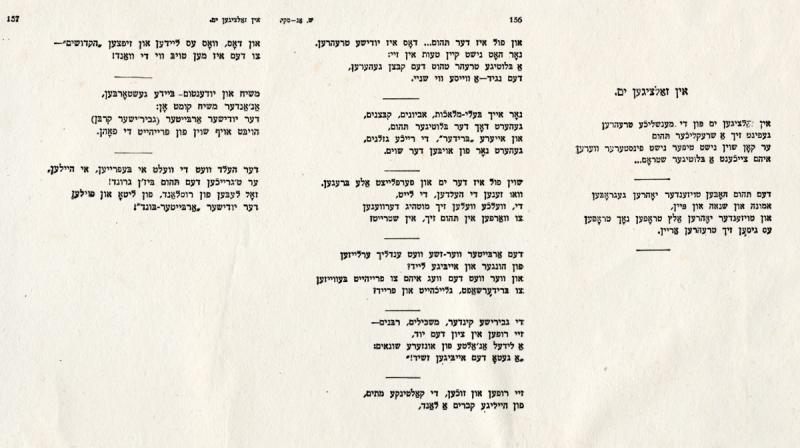
In zaltsikn yam
[1901]
Testo / Lyrics / Paroles / Sanat: Semën Akimovič An-skij
Musica / Music / Musique / Sävel: [?]
Il canto che segue, scritto nel 1901 da Semën Akimovič Rappoport, più noto come “S. An-skij”, assieme a Di shvue e noto anche come In zaltsikn yam fun di mentshlekhe trern e come Tsum Bund, è l'inno riconosciuto dell'Unione Generale dei Lavoratori Ebrei della Lituania, Polonia e Russia (Algemayner Yidisher Arbeter Bund in Lite, Poyln un Rusland), più nota semplicemente come “Bund”. Movimento fondato a Vilnius il 7 ottobre 1897, che si riprometteva di unificare tutti i lavoratori ebrei dell'Impero Russo sotto un unico partito socialista, e di allearsi con il movimento socialdemocratico russo per la realizzazione di una società democratica e socialista, e per ottenere il riconoscimento giuridico degli ebrei come minoranza nazionale.
Tsum Bund WanDeRer WanDeRer-Trio... (Continues)
[1901]
Testo / Lyrics / Paroles / Sanat: Semën Akimovič An-skij
Musica / Music / Musique / Sävel: [?]
Il canto che segue, scritto nel 1901 da Semën Akimovič Rappoport, più noto come “S. An-skij”, assieme a Di shvue e noto anche come In zaltsikn yam fun di mentshlekhe trern e come Tsum Bund, è l'inno riconosciuto dell'Unione Generale dei Lavoratori Ebrei della Lituania, Polonia e Russia (Algemayner Yidisher Arbeter Bund in Lite, Poyln un Rusland), più nota semplicemente come “Bund”. Movimento fondato a Vilnius il 7 ottobre 1897, che si riprometteva di unificare tutti i lavoratori ebrei dell'Impero Russo sotto un unico partito socialista, e di allearsi con il movimento socialdemocratico russo per la realizzazione di una società democratica e socialista, e per ottenere il riconoscimento giuridico degli ebrei come minoranza nazionale.
Tsum Bund WanDeRer WanDeRer-Trio... (Continues)
[1] אין זאַלציקן ים פֿון די מענטשלעכע טרערן
(Continues)
(Continues)
Contributed by Riccardo Venturi 2019/11/20 - 03:16
Song Itineraries:
The War of Labour: Emigration, Immigration, Exploitation, Slavery
גוטער זכרון
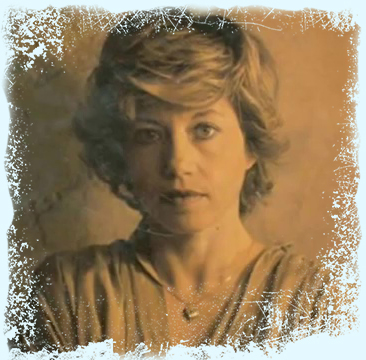
Guter zikorn
[2006]
פּאָעזיע / Poesia / A Poem by / Poésie/ شعر / Runo:
Binem Heller / בינם העלער
מוזיק/ Musica / Music / Musique / موسيقى / Sävel:
Chava Alberstein / חוה אלברשטיין
פּערפאָרמער/ Interpreti / Performed by / Interprétée par / مترجمين / Laulavat:
Chava Alberstein / חוה אלברשטיין
אלבאם / Album :
Lemele / לעמעלע
Lemele (pecora) è il 58° album di Chava Alberstein pubblicato nel 2006. Guter Zikorn è la traccia #1.
Binem Heller è stato un poeta, letterato e saggista che ha lasciato numerose opere. Segue la sua biografia
Binem Heller (January 25, 1908- May 12, 1998)
He was born in Warsaw, Poland, into a poor Hassidic family. He studied in religious elementary school and yeshiva. At age fourteen he became a glove-maker, and later he joined the Communist cause and thus had to leave Poland. From 1937 to May 1939, he lived in Belgium and Paris, later returning... (Continues)
[2006]
פּאָעזיע / Poesia / A Poem by / Poésie/ شعر / Runo:
Binem Heller / בינם העלער
מוזיק/ Musica / Music / Musique / موسيقى / Sävel:
Chava Alberstein / חוה אלברשטיין
פּערפאָרמער/ Interpreti / Performed by / Interprétée par / مترجمين / Laulavat:
Chava Alberstein / חוה אלברשטיין
אלבאם / Album :
Lemele / לעמעלע
Lemele (pecora) è il 58° album di Chava Alberstein pubblicato nel 2006. Guter Zikorn è la traccia #1.
Binem Heller è stato un poeta, letterato e saggista che ha lasciato numerose opere. Segue la sua biografia
Binem Heller (January 25, 1908- May 12, 1998)
He was born in Warsaw, Poland, into a poor Hassidic family. He studied in religious elementary school and yeshiva. At age fourteen he became a glove-maker, and later he joined the Communist cause and thus had to leave Poland. From 1937 to May 1939, he lived in Belgium and Paris, later returning... (Continues)
[1] גוטער זכּרון
(Continues)
(Continues)
Contributed by Riccardo Gullotta 2019/9/11 - 00:10
Song Itineraries:
Ghettos
רייזעלע
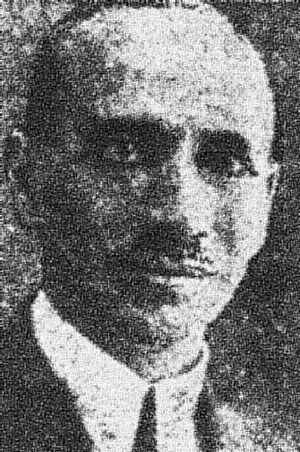
[1938/40]
Reyzele
טעקסט / Testo / Lyrics / Paroles / Sanat: מרדכי געבירטיג - Mordekhay Gebirtig
מוזיק / Musica / Music / Musique / Sävel: מרדכי געבירטיג - Mordekhay Gebirtig
יבערזעצן / Interprete / Performed by / Interprétée par / Laulaa : Chava Alberstein - חוה אלברשטיין
E’ una famosa canzone yiddish di Mordechai Gebirtig. Fu composta presumibilmente tra il 1938 e il 1940.
Come nelle altre sue canzoni, la vita ,i sentimenti e le usanze ebraiche nel periodo antecedente l’Olocausto sono tratteggiati con la semplicità e la tenerezza di un grande interprete della cultura yiddish .Si divise tra l’impegno politico nel Bund ed il teatro. Avrebbe potuto salvarsi lasciando il Ghetto di Cracovia ma rifiutò. Fu fucilato dai nazisti per strada nel 1942.
I confinati nel Ghetto, tra cui la sua famiglia e i suoi compagni, finirono nei campi di sterminio in 11.000, vittime del piano delle... (Continues)
Reyzele
טעקסט / Testo / Lyrics / Paroles / Sanat: מרדכי געבירטיג - Mordekhay Gebirtig
מוזיק / Musica / Music / Musique / Sävel: מרדכי געבירטיג - Mordekhay Gebirtig
יבערזעצן / Interprete / Performed by / Interprétée par / Laulaa : Chava Alberstein - חוה אלברשטיין
E’ una famosa canzone yiddish di Mordechai Gebirtig. Fu composta presumibilmente tra il 1938 e il 1940.
Come nelle altre sue canzoni, la vita ,i sentimenti e le usanze ebraiche nel periodo antecedente l’Olocausto sono tratteggiati con la semplicità e la tenerezza di un grande interprete della cultura yiddish .Si divise tra l’impegno politico nel Bund ed il teatro. Avrebbe potuto salvarsi lasciando il Ghetto di Cracovia ma rifiutò. Fu fucilato dai nazisti per strada nel 1942.
I confinati nel Ghetto, tra cui la sua famiglia e i suoi compagni, finirono nei campi di sterminio in 11.000, vittime del piano delle... (Continues)
[1] שטייט זיך דאָרט אין געסעלע
(Continues)
(Continues)
Contributed by Riccardo Gullotta + CCG/AWS Staff 2019/8/5 - 13:10
אין געטאָ הערשט הײַנט רו
Anonymous
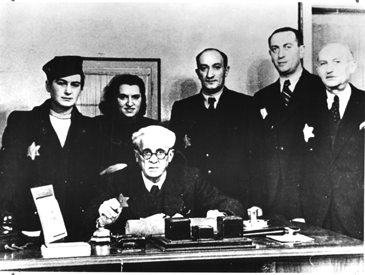
Im geto hersht haynt ru
(ca 1941/42?)
Canzone popolare del ghetto di Łódź
La canzone proviene dal ghetto di Łódź; come per molte altre canzoni registrate dalla Commissione Storica Ebraica di Monaco, nel 1946, non si ha nessuna notizia né sull'autore del testo, né su chi la abbia mai eseguita. Fu pubblicata parzialmente nell'antologia Min hametsar karati, a Gerusalemme nel 1954 (p. 66). La melodia è quella di una canzone popolare yiddish; il testo, sia in caratteri ebraici che in trascrizione, proviene da Heartstrings, "Corde del Cuore", la sezione musicale dello Yad Vashem.
Si tratta di una tipica “canzone di strada” del ghetto di Łódź, quello gestito con ferrea mano ed in pieno “spirito di collaborazione” da Chaim Mordechai Rumkowski e dal suo Judenrat. Come parecchie altre canzoni del ghetto di Łódź, è in forma assolutamente ironica e umoristica (il famoso, e spesso amaro, umorismo... (Continues)
(ca 1941/42?)
Canzone popolare del ghetto di Łódź
La canzone proviene dal ghetto di Łódź; come per molte altre canzoni registrate dalla Commissione Storica Ebraica di Monaco, nel 1946, non si ha nessuna notizia né sull'autore del testo, né su chi la abbia mai eseguita. Fu pubblicata parzialmente nell'antologia Min hametsar karati, a Gerusalemme nel 1954 (p. 66). La melodia è quella di una canzone popolare yiddish; il testo, sia in caratteri ebraici che in trascrizione, proviene da Heartstrings, "Corde del Cuore", la sezione musicale dello Yad Vashem.
Si tratta di una tipica “canzone di strada” del ghetto di Łódź, quello gestito con ferrea mano ed in pieno “spirito di collaborazione” da Chaim Mordechai Rumkowski e dal suo Judenrat. Come parecchie altre canzoni del ghetto di Łódź, è in forma assolutamente ironica e umoristica (il famoso, e spesso amaro, umorismo... (Continues)
אין געטאָ הערשט הײַנט רו
(Continues)
(Continues)
Contributed by Riccardo Venturi 2017/4/3 - 21:07
Song Itineraries:
Ghettos
L'estaca

YIDDISH [The Klezmatics, 2016]
"No Copyright © Courtesy of Label World Village. Support the artist. The Klezmatics - Apikorsim, 2016.
With their latest album, Apikorsim, The Klezmatics - world-renowned, GRAMMY-winning superstars of the klezmer universe - continue to redefine Yiddish music. Heretics, rebels and questioners, Apikorsim are people who challenge orthodox opinions. The Klezmatics are decidedly unorthodox. Their songs proclaim the rights of refugees and workers, sing ecstatically for a better world and mournfully for its losses. They alternately praise God and question the nature of his existence. Apikorsim is the first Klezmatics album with no special guests, session musicians or cross-genre collaborations. This is the sound of the band itself, a sound that has electrified audiences around the world for thirty years."
Nel video: Lorin Sklamberg dei Klezmatics mentre registra... (Continues)
"No Copyright © Courtesy of Label World Village. Support the artist. The Klezmatics - Apikorsim, 2016.
With their latest album, Apikorsim, The Klezmatics - world-renowned, GRAMMY-winning superstars of the klezmer universe - continue to redefine Yiddish music. Heretics, rebels and questioners, Apikorsim are people who challenge orthodox opinions. The Klezmatics are decidedly unorthodox. Their songs proclaim the rights of refugees and workers, sing ecstatically for a better world and mournfully for its losses. They alternately praise God and question the nature of his existence. Apikorsim is the first Klezmatics album with no special guests, session musicians or cross-genre collaborations. This is the sound of the band itself, a sound that has electrified audiences around the world for thirty years."
Nel video: Lorin Sklamberg dei Klezmatics mentre registra... (Continues)
דער יאָך [1]
(Continues)
(Continues)
Contributed by CCG/AWS Staff 2017/2/8 - 19:56
?װער קלאַפּט עס
Anonymous

Il brano originale tratto da Mlotek, E. & J. Songs of Generations, p.21
Ver klapt dos azoy shpet bay nakht?
(Continues)
(Continues)
Contributed by Dq82 2016/8/24 - 11:40
עס איז אַ קלאָג
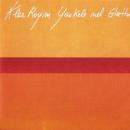
Doppia trascrizione della precedente strofa:
1. Secondo i criteri YIVO e in yiddish standard
2. Trascrizione tradizionale secondo la pronuncia
1. Secondo i criteri YIVO e in yiddish standard
2. Trascrizione tradizionale secondo la pronuncia
1.A komisar ken ikh zeyer a kluger.
(Continues)
(Continues)
Contributed by Riccardo Venturi 2016/8/14 - 09:01
עס איז אַ קלאָג
La trascrizione in caratteri latini in base alla pronuncia e alle varianti locali (riscritta in base ai criteri YIVO)
Romanized lyrics according to pronunciation and local variants (rewritten according to YIVO principles)
Romanized lyrics according to pronunciation and local variants (rewritten according to YIVO principles)
ES IZ A KLUG
(Continues)
(Continues)
Contributed by DQ82 + CCG/AWS Staff 2016/8/14 - 07:12
עס איז אַ קלאָג
Trascrizione del testo secondo i criteri YIVO
Romanized lyrics according to YIVO principles
Nota. L'esistenza di un testo effettivo in caratteri ebraici עס איז א קלאג è testimoniata da questa pagina, dalla quale il testo è attribuito a Moyshe Kigelman. Dovrebbe essere stata raccolta da "From the Ben Stonehill collection of Jewish folksongs. Recorded at Hotel Marseilles, New York City, 1948."
Romanized lyrics according to YIVO principles
Nota. L'esistenza di un testo effettivo in caratteri ebraici עס איז א קלאג è testimoniata da questa pagina, dalla quale il testo è attribuito a Moyshe Kigelman. Dovrebbe essere stata raccolta da "From the Ben Stonehill collection of Jewish folksongs. Recorded at Hotel Marseilles, New York City, 1948."
ES IZ A KLOG
(Continues)
(Continues)
Contributed by Riccardo Venturi 2016/8/14 - 07:05
עס איז אַ קלאָג

Ulteriore strofa raccolta da Frankiel, che fa riferimento ad un altro personaggio inetto alla "corte" di Rumkowski
אַ קאָמיסאַר זײער אַ קלוגער.
(Continues)
(Continues)
Contributed by Dq82 + RV 2016/8/2 - 11:48
װײַל איך בין אָ ייִדעלע
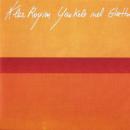
Trascrizione del testo in caratteri latini.
Romanized Yiddish lyrics
Nota sulla trascrizione. Avendo ripristinato il testo in caratteri ebraici, si è posto il problema se mantenere o meno la trascrizione con cui questa pagina è stata aperta. Tale trascrizione sembra mostrare caratteri dialettali o locali (ad es. fin per fun, e la chiusura in “u” di molte “o” (ungefangen, ungehoybn, milkhume per on-, milkhome). Si tratta comunque di pronunce che erano largamente diffuse tra i parlanti dello yiddish. La trascrizione è stata quindi rifatta (anche per alcune incongruenze, come forydine per frayndine “amica”, probabilmente per un refuso, oppure fabricant con una "c" non prevista dagli standard YIVO) seguendo il testo in caratteri ebraici, ma dando qui conto dell'aspetto che ha la trascrizione qui presentata in origine. [RV]
Romanized Yiddish lyrics
Nota sulla trascrizione. Avendo ripristinato il testo in caratteri ebraici, si è posto il problema se mantenere o meno la trascrizione con cui questa pagina è stata aperta. Tale trascrizione sembra mostrare caratteri dialettali o locali (ad es. fin per fun, e la chiusura in “u” di molte “o” (ungefangen, ungehoybn, milkhume per on-, milkhome). Si tratta comunque di pronunce che erano largamente diffuse tra i parlanti dello yiddish. La trascrizione è stata quindi rifatta (anche per alcune incongruenze, come forydine per frayndine “amica”, probabilmente per un refuso, oppure fabricant con una "c" non prevista dagli standard YIVO) seguendo il testo in caratteri ebraici, ma dando qui conto dell'aspetto che ha la trascrizione qui presentata in origine. [RV]
VAYL IKH BIN A YIDELE
(Continues)
(Continues)
2016/7/28 - 05:38
×
![]()


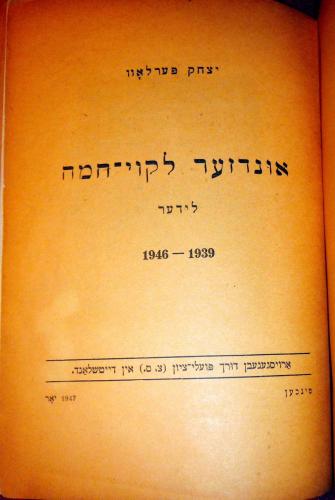

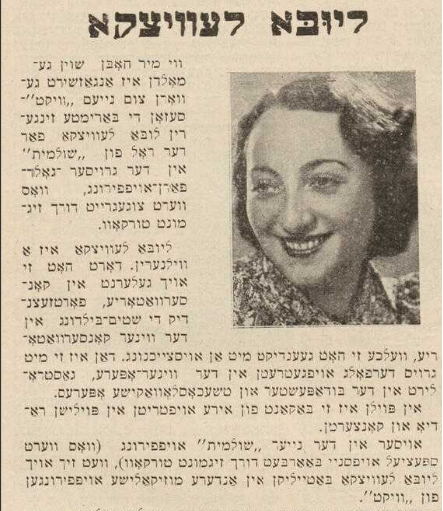
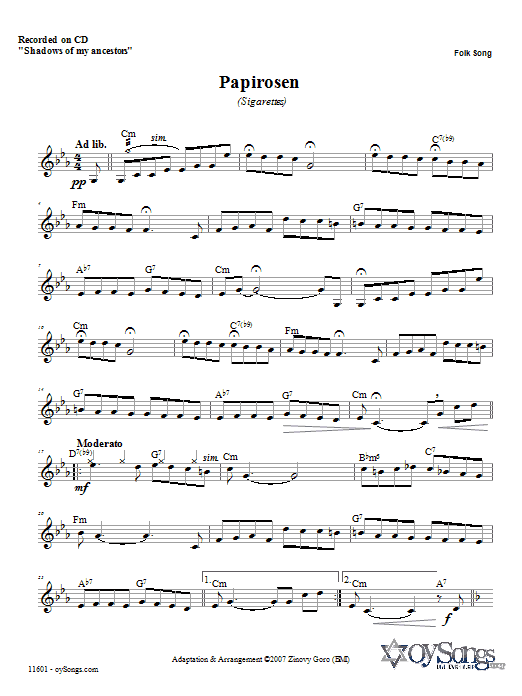
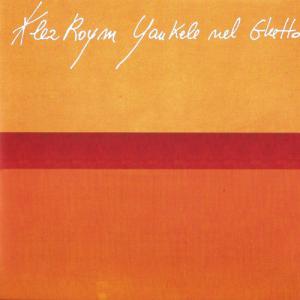
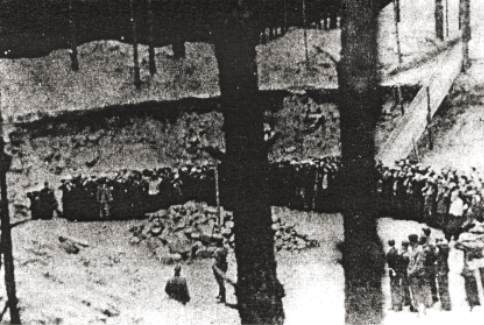
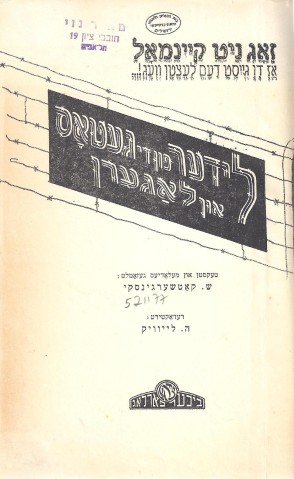
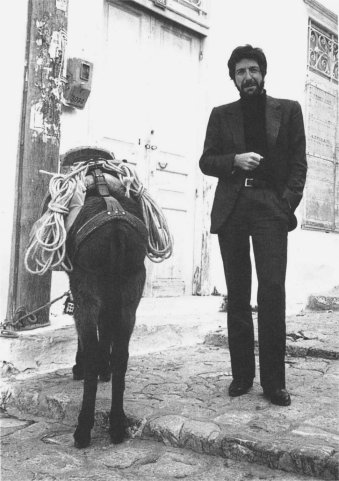
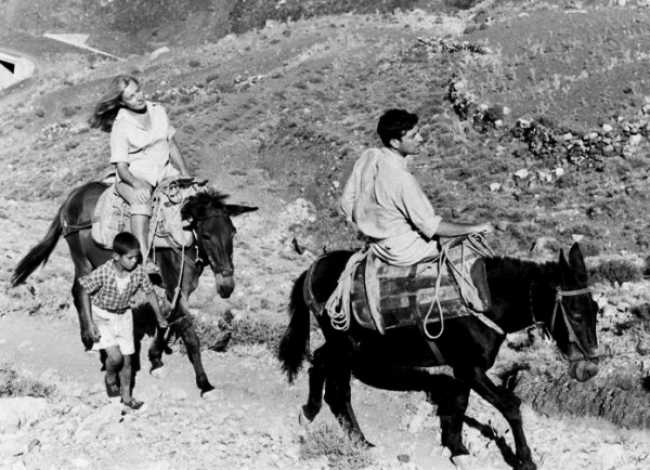
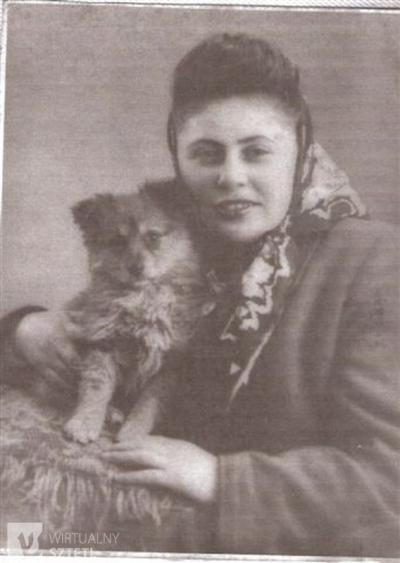
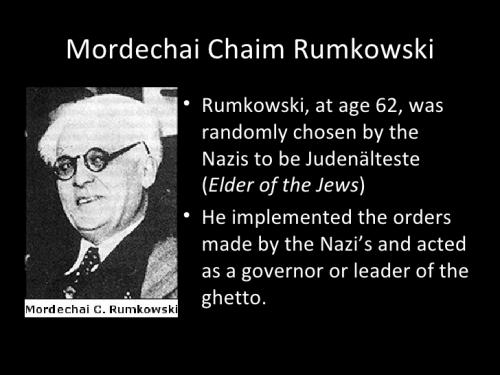
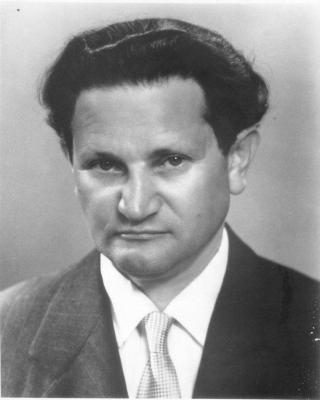
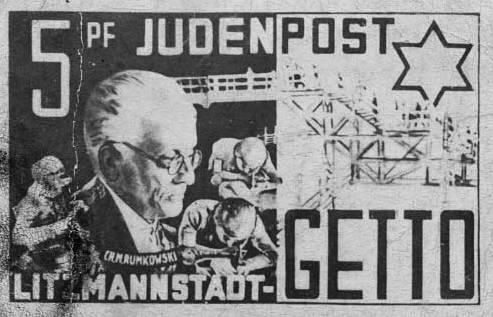
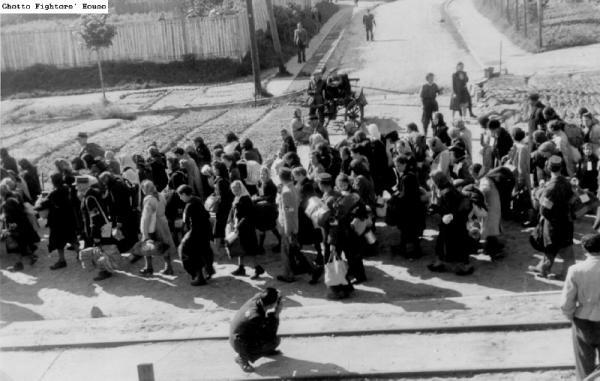
194?
2018
Yiddish Glory – The Lost Songs Of World War II
The song “Kazakhstan” with anonymous lyrics presumably by an evacuated Polish Jewish refugee, is the only one for which entirely original music (by Erdenko) is employed. That song, delivered in a smoky jazz idiom by Milman, is later reprised in a more muscular voicing by Erdenko.